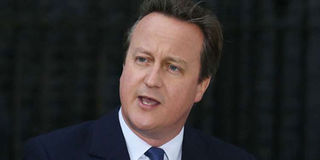Let us practise democracy in what we say and do

This photo taken on July 13, 2016 shows Britain's Prime Minister David Cameron speaking outside 10 Downing Street in central London before going to Buckingham Palace to tender his resignation to Queen Elizabeth II. PHOTO | JUSTIN TALLIS | AFP
What you need to know:
- There may be a question that those who call themselves leaders may want to ask themselves when trying to create political structures that work for Kenya.
Is it about them or is it about Kenyans?
For now, it would seem that it is about them.
There is one thing about our politics that worries me. I believe that if we really want to be like the rest of the civilised world there should be no reason for us to fall short of the effort. The truth, whether we like it or not, is that there are certain experiences of the more experienced and therefore developed societies of the world that we may want to take note of to our advantage.
Think of it. In June, the UK went through a major political event. Through a referendum, they opted out of the European Union. Soon after the vote, David Cameron, the country's prime minister, opted to resign and quickly someone else took over. During this month, the same man has offered to resign his seat as Member of Parliament, insisting that as a former prime minister, his continued presence in Parliament will be a distraction to the business of the House and operations of the government that he supports.
All these political events have happened pretty smoothly. I wonder whether this would ever be possible in Kenya as we know it.
We may never get an answer to that question but, since we have accepted that we are a democratic country that intends to be like the rest of the civilised world, we may want to also accept a few realities of life.
A REALITY
The most important one is that democracy, as we know it, has been a reality in the global society for a long time no matter how much totalitarian regimes have fought it.
When representatives of the people got together in an agora in ancient Greece to exchange ideas about how they wanted matters affecting the people – demos – to be handled, it was a foreshadowing of modern parliamentary practices.
Over time, this has evolved to the democratic behaviour we see in democracies such as the US, the UK and other parts of the civilised world.
We Kenyans have accepted that this is the way to go. It would, however, sometimes seem that a lot of our so-called leaders give us different indicators.
Democracy was thought about longer than we have existed. Some people operate as if we have to reinvent the wheel. Do we have to?
Moving forward, trying to create political structures that work for our country, there may be a question that those who call themselves leaders may want to ask themselves.
Is it about them or is it about Kenyans? For now, it would seem that it is about them. Of course, our issues can never be solved at funerals. Let the dead rest in peace.
Fr Dominic Wamugunda is dean of students, University of Nairobi; [email protected].





